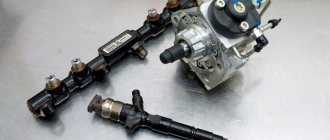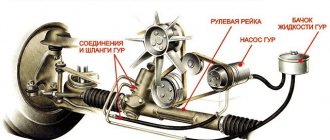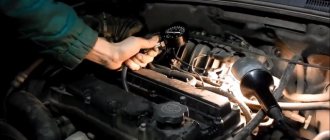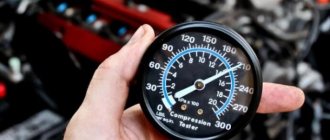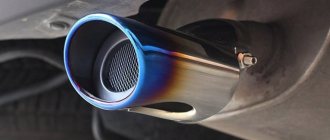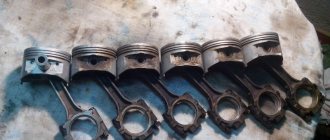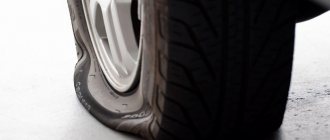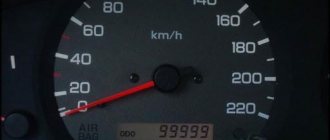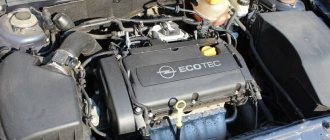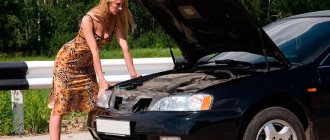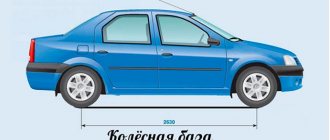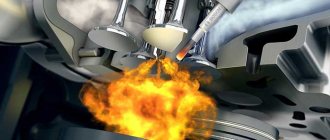string(10) “error stat”
Popping sounds in the muffler is a problem that deserves the attention of a car enthusiast: most often this indicates an engine malfunction. Most often, such excesses occur in power units in which fuel is supplied through a carburetor, although there is a chance to hear them from cars running on gas.
Carburetor power units differ from their more modern counterparts in their frequent overflow, but this is far from the only cause of problems. Popping noises in the muffler at idle speed are a consequence of the fact that the mixture of air and fuel does not burn and enters the intake manifold. It is there that its explosion occurs, which gives rise to a loud, specific sound.
The situation when the engine shoots into the muffler is typical for engines that run on any type of fuel. Yes, it is carburetor power units that hold the palm and “please” with pops most often, but owners of cars with injectors are not immune from this problem.
So why does it shoot at the muffler? Contrary to popular belief, the reason for the spontaneous ignition of the mixture is not only a violation of the gas distribution phases - in fact, there are many more reasons for such a problem. Therefore, with a high degree of probability, the usual replacement of the engine air filter and debugging of the fuel supply may not be enough.
Popping sounds in the muffler, injection engine, reasons
The appearance of pops or even “shots” in the muffler indicates the occurrence of malfunctions in the operation of the car engine.
The popping sound in the muffler itself is most often a consequence of the explosive combustion of fuel in the engine exhaust tract. Let's consider several of the most common causes of this malfunction applicable to a fuel-injected car engine.
Popping noises in the muffler when a car's fuel-injected engine is running, causes of malfunction
— Mixture formation is disrupted
The engine is running on too rich a fuel mixture.
It does not burn completely and its remains are thrown into the exhaust system. The formation of a rich fuel mixture can be caused by a malfunction of the fuel injection system: increased pressure in the system (fuel rail) due to a malfunction of the fuel pressure regulator, clogged injectors (they do not spray fuel, but pour).
— Misfires in the ignition system
Popping noises and “shots” are heard in the muffler due to faulty spark plugs (failure, small gap between electrodes, carbon deposits on the electrodes), ignition coil (module), “broken” high-voltage wires. Elements of the ignition system that work only once in a while or that have completely failed reduce the strength of the spark on the electrodes of the spark plugs, or do not allow it to appear at all. The fuel in the combustion chamber does not burn and is thrown out into the exhaust tract during the exhaust stroke.
— Elements of the engine control system are faulty
The crankshaft position sensor (CPS) synchronizes the operation of the injection system with the position of the pistons in the cylinders. Its malfunction, displacement, contamination. Failure of its wiring leads to untimely injection and ignition of fuel. As a result, the fuel is ignited either too late, too early, or is not ignited at all and is thrown out during the exhaust stroke into the engine exhaust system, where it burns out with pops and “shots.”
Crankshaft position sensor
The ECM for Euro-3 and higher standards has a camshaft position sensor (phase sensor), which is also responsible for timely fuel injection. Its malfunction also leads to untimely injection and ignition of fuel.
The oxygen sensor (OS), based on the signal from which the control unit (ECU) determines whether the fuel mixture is rich or lean, in the event of a malfunction will provide incorrect information and the unit may increase the fuel supply through the injectors. The mixture will become too rich and not burn completely.
In addition, the following are involved in preparing the fuel composition (injection duration, calculation of air volume, ignition timing): a throttle position sensor (TPS), a mass air flow sensor (MAF) or an absolute pressure sensor.
— Car engine is faulty
The valve timing is off when repairing or replacing the belt. The position of the crankshaft and camshaft relative to each other is incorrect. Fuel injection and ignition will not coincide (or will not completely coincide) with the engine strokes.
Valves are faulty. Their thermal clearances are not adjusted (the valve does not close completely during the compression stroke and the mixture is thrown into the exhaust manifold). The valve is burnt out and the seal of the combustion chamber is broken, which also leads to the ejection of the mixture and popping noises in the muffler.
Carbon deposits on valve plates. Carbon deposits prevent the valve from closing tightly.
Notes and additions
Almost always, pops and “shots” in the muffler are accompanied by unstable engine idling, blackening of the spark plug electrodes, decreased power and throttle response, dips and jerks in movement (after pressing the gas pedal). In addition, the neutralizer installed in the exhaust gas system suffers. Its cells melt as a result of such afterburning of fuel and very quickly it may require replacement. Which is not cheap.
When diagnosing this malfunction in the operation of a car’s injection engine, you should first of all pay attention to the tightness of the exhaust gas exhaust system. The leakage of foreign air through a rusted muffler or resonator may be accompanied by similar pops of varying intensity.
Source
Causes of popping
The main reason for popping noises in the muffler when releasing gas in injection or carburetor systems is unburned fuel. It enters the exhaust system, where it ignites, hence the loud noise, like a bang. It is fair to say that the louder the popping sound is, the more fuel has leaked from the system. Sometimes it happens that several “shots” occur in a row. This situation should absolutely not be allowed to happen. It is worth noting that popping noises in the muffler when releasing gas on an injection-type engine, as well as on a gasoline engine, is only a consequence. To get rid of the defect, it is necessary to understand how the fuel got into the exhaust system and solve this particular defect.
As for the malfunctions due to which this can happen, this can include a problem with the carburetor or injector itself, timing belt defects, or ignition systems. If we are talking about an injection type engine, then the failure of various sensors can be added to the breakdown.
It is worth noting that popping noises may occur in the muffler when releasing gas from the injection system, as well as when over-gasping or while the engine is idling. In addition to the characteristic popping sound, a large amount of smoke will come out of the chimney immediately after this. In addition to these two obvious signs, there are several others that indicate the presence of such a malfunction. These include loss of engine power, floating idle speed, as well as increased fuel consumption.
How to diagnose and what exactly needs to be checked?
First, you need to check the air filter located at the entrance to the exhaust system. If it is very dirty, it will have to be replaced, since the air filter cannot be cleaned. Problems can be avoided if you change the element on time.
If the carburetor is faulty, you need to check the gasoline chamber in which the float is located. The settings for all carburetors are individual, so the level is required in each case. The float should be level with the lid. Otherwise, the carburetor needs to be adjusted.
The float itself may show an incorrect value due to damage. For example, if this element has a hole, fuel penetrates inside it. Naturally, after this the readings will be incorrect.
When diagnosing, you need to check the spark plugs and replace failed elements. New spark plugs must have the same heat rating as the removed ones.
The cylinder head thermal clearance needs to be adjusted - if it is incorrect. The valves on all cylinders are manually adjusted when cold.
Problems with the timing belt can be resolved by tightening it or replacing it (if tightening does not produce results). But if there is significant wear, we definitely replace the toothed pulley. Worn valves can be sanded if they are scratched, or ground in if there are rough spots.
Shots in the muffler area occur regardless of the type of engine - be it an injector or a carburetor. They happen at idle and when the engine is warm. But this is only an external sign - behind it lies serious problems that need to be solved immediately.
Air filter as the cause of the problem
One of the reasons that can cause popping noises in the muffler when releasing gas is an incorrectly formed fuel mixture. To form it, only two components are used - gasoline and a small amount of air. The latter enters the system through a system of tubes, at the inlet of which there is an air filter. If this part becomes clogged, then it is not able to pass the required amount of air through itself, and therefore the engine begins to suffer from “oxygen starvation”. Naturally, because of this, it is not possible to completely burn the fuel, and therefore it enters the manifold, from where it flows into the exhaust gas system, creating pops in the muffler when gas is released. The popping noise itself occurs due to the fact that the fuel in the muffler heats up and subsequently explodes.
As for fixing the problem described, it is quite simple. It is necessary to check the air filter located at the entrance to the system. It cannot be cleaned, and therefore, if it is clogged enough, you just need to replace it with a new one. The problem is the easiest to fix. It occurs most often in cases where the filter has not been changed for some time after it was required to be done according to the regulations. In this case, popping noises in the muffler are most easily eliminated.
Fuel mixture
Question: why does fuel get inside the cylinder? The answer is simple: a rich fuel mixture is the reason. And it is formed due to problems in mixture formation.
A little theory. It has been established that for flawless functioning, a car engine needs a mixture that includes the correct proportions. The proportion of gasoline should be fifteen parts of air. Thus, the NSS (standards of the stoichiometric mixture) is calculated. This is the best fuel assembly ratio at which the engine is able to produce enough power without taking a lot of fuel for this. This results in the most optimal and economical operating mode.
If the amount of air is reduced, for example, to 11-12 parts, this already results in an enriched fuel assembly. The motor, naturally, will produce more power, but it will also consume a lot. If you continue to reduce the air index, the mixture will already become over-rich. It should be understood that fuel assemblies with a 1x5 ratio are no longer flammable.
And vice versa. If you increase the air index or decrease the amount of fuel, the fuel assembly will become lean. Engine power will instantly drop, although efficiency will improve. The fuel assembly loses its ability to ignite if the ratio is 1x20. In addition, a lean fuel assembly does not contribute to fuel economy in all operating modes of the power unit. For example, when trying to climb a hill, the driver will press the accelerator pedal to get the desired output from the engine.
Thus, the proportions in fuel assemblies must be standardized. If there is more fuel in it than needed, the remaining amount of air will not be enough to ignite the mixture normally. The remaining fuel will enter the manifold through the outlet, then penetrate into the muffler, and at some point explode.
This happens especially often, as mentioned, on carburetor internal combustion engines, but injection engines are no exception in this regard. Often, lumbago occurs in the idle mode, during gas changes, etc. In both cases, it is important to find and correct the problem in a timely manner.
For example, the driver himself can carry out initial diagnostics, checking the quality of the fuel assembly by adding air to the system. If the shots stop after a while, then the problem is clearly in the air filter, which may be very dirty. It needs to be replaced and the air duct cleaned.
As a rule, in most cases it does not end with one filter. Injectors need more in-depth diagnostics. If it were a carburetor, then it would be possible to check the fuel level in the chamber on site, blow out the jets, etc. In injection systems, everything is much more complicated and it is recommended to carry out the check on professional equipment.
Carburetor and pops
Quite often it happens that popping noises in the exhaust system begin due to the fact that the carburetor was incorrectly configured. Its job is to create the correct fuel-air mixture, which is then supplied to the engine. If it happens that after adjusting it, it saturates the mixture too much with fuel, that is, gasoline, then the same thing as described above will begin to happen. That is, popping noises will begin to occur in the muffler when gas is released from the carburetor system. Naturally, the only correct way out in such a situation would be to reconfigure this element.
The first thing to do in this case is to check the gasoline level in the chamber in which the special float is located. It is important to know here that each carburetor is adjusted individually, and therefore each has its own optimal level. However, there is one common feature: if you remove the cover, the float should be flush with the level of the cover. If this is not the case, then you need to make adjustments. In addition, you should immediately check the integrity of the float itself. If it has any deformations, this can lead to fuel getting inside it, and therefore it indicates the wrong gasoline level.
Another reason for popping noises in the muffler is the system jets. They may also be incorrectly configured or, if they have been in use for a long time, become dirty. In this case, the same thing will happen as happened with a dirty air filter. Jets are the same as air filters, with the only difference being that they are used in a carburetor system to create a mixture, and not in an injection system. Their clogging means that the amount of air entering the chamber decreases, and therefore the mixture becomes oversaturated with gasoline. Quite often, popping noises in the muffler at idle speeds occur after a sharp transition has been made from such speeds to higher speeds. In addition, the cause may be a sharp increase in speed, that is, excessive acceleration. If after any of these actions popping sounds appear, then you need to check the carburetor.
HELP (shoots)
When the exhaust pipe fires, this happens when the idle system is unregulated, at the moment of over-enrichment of the working mixture; starting the engine can be accompanied by deafening shots in the muffler. Working at minimum speed, without any load, even a well-warmed engine runs intermittently. The gasoline mixture is excessively enriched due to malfunction of the fuel supply valve itself, which increases the level of fuel required for combustion in the float chamber. In this described second situation, as in the first case, there is also an over-enrichment of the working mixture, accompanied by shots coming from the exhaust pipe, usually with serious consequences for the engine.
When the main jet becomes clogged, the fuel mixture becomes lean. The very start of the engine is immediately accompanied by popping noises in the carburetor. By putting the car into driving mode, the development of a situation immediately becomes noticeable when the car cannot gain the necessary speed to continue moving. A clogged idle jet provides all the prerequisites for the presence of a lean fuel mixture in the carburetor. This becomes possible for several reasons: air is sucked in besides the carburetor, a violation of the idle mixture quality screw adjustment occurs, and also when air is sucked in besides the carburetor, under the carburetor flanges of the exhaust and intake pipes or under the flange of the cylinder block.
Let's take a closer look at when a car cannot reach the speed necessary to move, what happens in this case? Why does the exhaust pipe shoot?
When there is a delay in turning on the economizer valve, the fuel mixture becomes leaner. The result of such operation of the economizer valve is still the same: there is no development of high speed of the car. In this case, the engine overheats, fuel consumption increases, and the water in the radiator boils.
A stuck wastegate valve or accelerator pump piston causes a lean fuel mixture when the engine is running under load. In this situation, the car will also not develop high speed, moving from minimum speed to maximum speed, even a warm engine continues to work with great interruptions, spontaneous stops of the direct operation of the engine occur. Increased gas mileage is available.
When water appears in the sump of the fuel pump or in the fuel tank, the engine, being in a cold state, has poor starting, but starts somewhat better when warmed up. Clogged fuel lines, freezing in them or in the sump of the fuel pump will lead to a moment when starting the engine will be impossible at all. The reason for this impossibility of starting the engine may be that the fuel pipeline running from the fuel tank to the fuel pump is poorly ventilated. To eliminate this problem, the frozen water is heated with a water heater, and then the water is drained from the fuel tank and pipelines.
A rupture of the fuel pump diaphragm makes it impossible to start the car engine. In this case, it happens that the fuel sharply increases the oil level in the crankcase, and when you try to manually pump the pump, there is a weak supply of gasoline or no such supply at all.
Incomplete opening of the throttle valve leads to the fact that the car cannot reach high speed, and high fuel consumption occurs.
In a situation where the air damper is partially opened, then in this case there comes a time when the composition of the fuel mixture is disrupted. An excess of enrichment of the mixture itself provokes the generation of a moment when the exhaust pipe shoots. Transferring engine operation from low speeds to high speeds, while the warmed-up engine continues to operate intermittently, making spontaneous stops. The car does not develop high speed, engine operation is accompanied by shots in the exhaust pipe, and there is high gas consumption.
Popping sounds due to a problem with the ignition system
Popping noises in the muffler at idle or during normal operation can also be heard due to the fact that the ignition system was incorrectly configured. Most often, popping noises at idle, as well as at high speeds, are due to the fact that the ignition is too late. This is explained as follows. The moment the spark appears occurs when the supply valve has already fully opened. Because of this, some of the fuel manages to leak into the manifold, from where it flows into the exhaust system. If the ignition is, for example, too early, then there will still be “shots”, but they will occur in the air filter, and not in the exhaust pipe. In addition, popping noises in the muffler when pressing the gas, if they occur due to late ignition, are also dangerous because the intake valve may burn out over time. For these two reasons, it is necessary to repair such a breakdown very quickly.
Another reason that lies in the ignition system is spark plugs. The spark may be too weak, causing the fuel to not burn completely again. This may happen for the following reasons:
- There may be poor contact on high-voltage wires. To exclude this, firstly, you need to check, and, secondly, clean if necessary. In addition, you should check for the absence of such a defect as breaking through to ground.
- Another reason is a malfunction in the operation of a part such as a distributor. It should be checked anyway.
- The spark plugs themselves can fail. If this happens to at least one of them, then this will greatly affect the power of the spark that it produces, and therefore the combustion of fuel.
If the cause of the popping noise in the muffler was precisely the faulty spark plugs, then they need to be replaced, but only with those that have a suitable heat rating. Only in this case will the necessary power be provided to create a spark.
Why does the engine shoot into the carburetor: as a result, popping sounds appear
A fairly common problem with carburetor cars is the corresponding pops in the carburetor. The malfunction may occur when the engine starts and fires into the carburetor, also during operation of the internal combustion engine after the unit has been started. At the very beginning, we note that experts consider the main reasons to be a powerful depletion of the fuel-air mixture, ignition timing, or malfunctions of the gas distribution mechanism associated with incorrectly set phases.
As for the CIS (the Commonwealth of Independent States is a regional international organization (international treaty) designed to regulate cooperative relations between states that were formerly part of the USSR)
, most of the carburetor cars on the roads are Russian-made models. Next, we will look at the problems when a VAZ engine shoots into the carburetor, why a 406 engine shoots into the carburetor, and we will also talk about how to find and remove such faults with your own hands.
Thermal gap as the cause of all problems
First you need to understand what the thermal gap itself is. This is the distance by which individual parts of the engine can increase in volume when they are heated. Most often it can be found between elements such as valve lifters, as well as camshaft cams. An incorrectly set thermal gap may be one of the reasons why popping noises occur in the muffler on gas.
Indirect, but still evidence that the gap is too large, can be two factors. The first of them is a decrease in engine power, and the second is increased noise during its operation. If the gap is too small, it will cause gas to shoot out in the exhaust pipe. This happens for a completely understandable reason - a not completely closed valve will allow a small amount of gasoline to pass into the manifold, from where it flows into the exhaust gas system.
Naturally, the thermal clearance of the cylinder head can be adjusted. You will have to manually adjust the valve on each cylinder, and this can only be done on a cold engine.
Timing
Another reason that affects problems in the exhaust system is a phase violation in the gas distribution mechanism. In order for the power unit to function normally, the movement of the valves must be clearly coordinated with the compression strokes. Otherwise, the entire process is disrupted.
Failures of this kind are practically impossible on machines with a chain, but with a timing belt this happens much more often. The reason is that the belt shifts by 1-2 teeth or stretches too much, which leads to problems in the GRS mechanism. It’s a whole science to be able to determine that the belt is aligned correctly.
If the popping noises are the result of a stretched or misaligned timing belt, they will appear on a hot engine rather than on a cold one.
Timing problems
Popping sounds in a muffler whose engine operates with a faulty gas distribution mechanism (GRM) are inevitable. As for the problems that precede timing failure and further firing, they are somewhat similar to those that occur with an incorrectly configured ignition system.
In other words, the exhaust valve will open at a time when the gasoline has not yet completely burned. Naturally, unburned fuel will flow into the exhaust gas system, which will lead to the already familiar pops.
There are several reasons that can occur in the timing system, leading to the following consequences:
- A fairly common and first thing to check is timing belt wear. This problem can be identified by additional metallic popping or increased noise when the engine is running at low speed. If this happens, there are two options for troubleshooting. The first is to completely replace the belt, the second is to tighten it if it is loose but not worn out.
- It happens that when checking the timing system, wear of the toothed pulley is detected. It will not be possible to repair it in any way, and therefore you just need to replace it with a new one.
- Another reason is partial failure of the valves. Over time, they become covered with soot. This process is significantly accelerated if you fill the car with low-quality fuel. Naturally, this will lead to a decrease in the efficiency of the mechanism. The valve springs may become stuck, causing the engine to overheat. They need to be replaced if this happens. It may also be that scratches are found on the surface of the valves, which means they need to be sanded. If there are bends or roughness on the surface, grinding needs to be done.
It is also worth mentioning that popping noises in the muffler of VAZ cars and others that use a timing belt for operation are heard only when the engine is warm. If it's cold, there won't be any. This is also one of the proofs that the problem lies in the gas distribution mechanism.
Ignition retard
Loud shots from the muffler are also caused by an ignition problem, or more precisely, an incorrectly set advance angle. If the spark plug fires later than required, then sounds from the muffler may appear even “when it’s cold,” that is, when the engine is started directly. The reason is simple: in this case, ignition occurs at the moment the intake valve opens, which will lead to the unfortunate entry of the combustible mixture into the intake manifold.
Important: do not ignore this problem and immediately contact a service station, because prolonged operation of the engine with an incorrect ignition timing can lead to burnout of the exhaust pipe and even the valve.
The following situation is also possible: the ignition angles are set correctly, but the pops still do not disappear. In this case, you should look for the problem in the spark plugs and wiring. It also wouldn’t hurt to check all the toggle switches and contact groups. In rare cases, this may be caused by installing a spark plug with the wrong heat rating.
Popping sounds of injection engines
Popping noises when releasing gas from the muffler in carburetor engines occur more often than in injection engines, as practice shows. However, the injection system is still susceptible to this defect. It is worth noting that there are separate reasons for the occurrence of pops in the injection system.
In such cars, the engine's operation is controlled by the ECU, which controls based on a large amount of information received from various sensors. Naturally, false information from any of the sensors will lead to incorrect functioning of the entire system. For example, if false information is received from the air intake sensor, this will lead to an incorrect composition of the fuel-air mixture, as with carburetor engines. The problem will be the same, but its cause is slightly different.
Why can popping noises in the muffler occur in injection systems? This may be due to incorrect crankshaft operation. The position of the sensor of this part should be checked. If this device provides information about a displacement of one tooth, this will also lead to malfunction. In addition to these elements, the cause may be a “glitch” of the throttle or Hall position sensor, as well as some other elements.
The first thing that needs to be done when popping noises in the muffler begin during reset, idling and increasing speed is to conduct computer diagnostics if the car is equipped with an injection system. Such diagnostics should reveal which specific sensor or other element the breakdown occurred with. In addition, it is worth checking the injector itself using the same computer diagnostics.
Other reasons
There are a number of other reasons why a characteristic “shot” in the exhaust pipe may occur:
- The engine idling noise can occur due to two additional reasons. The first of them is a violation of the tightness of the intake manifold. The second is that the idle system itself is clogged.
- Low-quality gasoline or fuel with a low octane number can cause popping noises. It is best to refuel at reputable gas stations.
- Mixed spark plug wires. When replacing, checking or installing spark plugs, it may happen that the connected wires are mixed up. This may well be the cause of popping noises in the muffler. A characteristic feature of this particular problem is not only the “shot”, but also the fact that the car will not start at all.
- People who have an economizer installed in their system often encounter this problem. If it is available, then it is worth checking it.
- In some cases, popping noises in the exhaust pipe are caused by a malfunction of the air damper. If so, then it needs to be adjusted.
- If popping noises occur only when releasing gas, then there is a separate reason for this, which lies in the fact that the exhaust pipe of the muffler (or simply “pants”) is poorly screwed to the exhaust manifold. It is necessary to check the tightness of this connection and, if necessary, seal it, tighten it, etc.
- Another common cause is that the fuel injectors are too efficient. Drivers often say in such cases that they are “flowing.” In this case, they simply supply too much gasoline at once, which is why, even with normal spark power, it does not have time to burn before the exhaust valve opens. Therefore, fuel seeps into the pipe where the popping occurs. There is an easy way to check this defect. At high engine speeds and with the gas pedal pressed, try to start it (the so-called purge mode). If a popping noise occurs at these moments, then at least one of the injectors is leaking.
- As for other reasons for injection systems, there is such an issue as knock sensor fatigue, due to which ignition may occur too late. In addition, it may not respond correctly to extraneous noise occurring in the engine. Its performance can only be checked using computer diagnostics.
When the injector and diesel fire
In old power diesel devices, it was possible to manually mechanically adjust the timing of diesel injection. If the adjustment was carried out incorrectly, the fuel was compressed too much and white smoke came out of the engine. Today, such a situation is rare, since everything is controlled by electronics, including VAZ and Gazelle.
But there are other reasons that cause shooting in modern systems:
- The lambda probe, DBP and mass flow sensors are broken, or the throttle position is incorrectly set.
- The high voltage ignition unit is faulty.
- Controller errors.
- The working surface of the crankshaft position sensor is excessively contaminated with metal shavings.
If it is assumed that the problem is due to controller errors, then you can try resetting the settings by disconnecting the battery for fifteen minutes. Even if the method helped, it is still recommended to check the car at a service center to avoid a recurrence of the situation.
If, when releasing gas, the power unit often fires, then there is a possibility of problems with the gas equipment of the car. The system supplies liquefied propane to the cylinders under the control of a separate electronic unit; the process involves a reducer and valves along with a cylinder. If any breakdowns occur in the system, the gas will overflow, resulting in popping noises. There is no need to explain why to go to the service center in this case - independent repair is impossible.
Claps with gas equipment
It is worth saying that this problem is also present in cars that use liquefied gas as fuel.
The cause of popping noises may be insufficient and unstable gas supply. Most often this is done either due to incorrect settings of the gas reducer or due to a clogged air filter. The reasons are similar to gasoline engines. The solution to the problems is also similar, that is, you need to either change the filter or reconfigure the gearbox. If gas is used as fuel, and the engine itself is injection, then the problem may be in the mass air flow sensor (MAF).
Incorrect ignition angle can also cause the popping sound. Here, in principle, the problem will be similar to that described earlier in a gasoline engine. With late ignition, cotton will be in the muffler, with early ignition - in the air filter.
Conclusion
At the end, it is worth summing up all of the above. Firstly, popping noises in the muffler are a non-critical problem, but quite unpleasant, and it’s worth addressing it as quickly as possible. Secondly, in addition to external sound factors, there are also internal ones, which lie in the fact that the engine and gas exhaust systems will deteriorate. In addition, slamming means excessive consumption of fuel, which means an increase in the cost of purchasing it. When a car is used for a long time with such a problem, certain parts may burn out, which will completely disable the car and require more money and time for repairs. Popping noises in the muffler on an injection engine may not be eliminated without diagnostics.
Source
